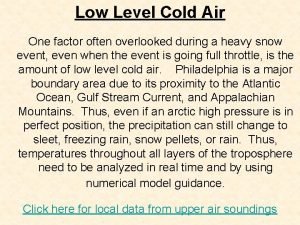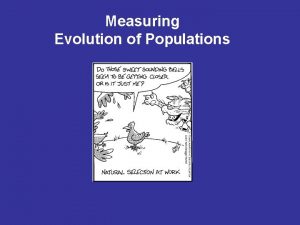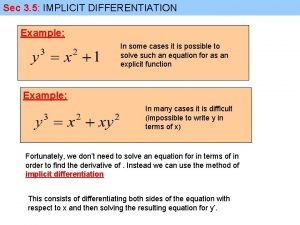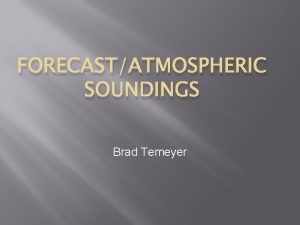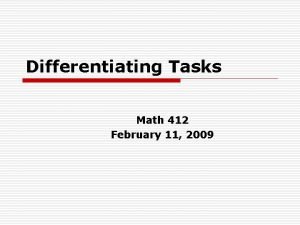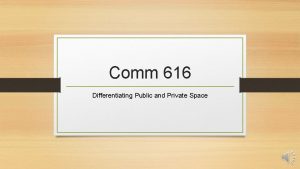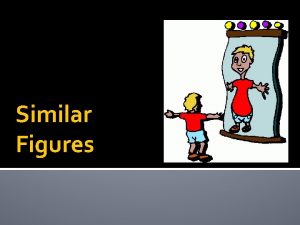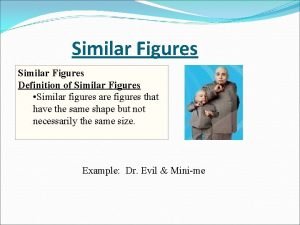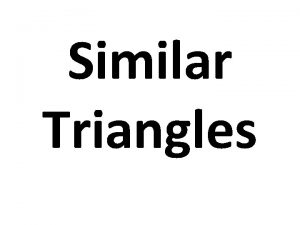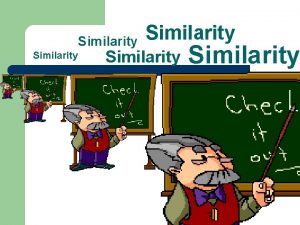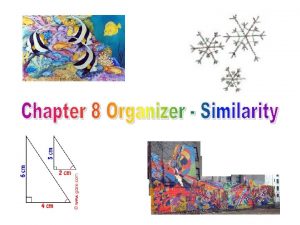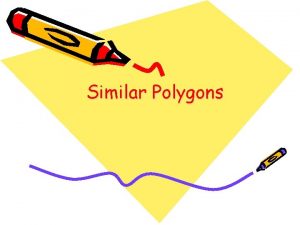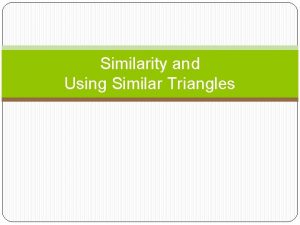Differentiating among Similar Careers among Similar Sounding Career

















- Slides: 17

Differentiating among Similar Careers & among Similar Sounding Career Titles Barbara G. Licht, Ph. D. Department of Psychology Florida State University

Topics to be Covered 1. Comparing graduate programs that train you to assess and treat psychological problems 2. Comparing graduate programs that train you to apply psychology to managing employees &/or product development. 3. Comparing careers that begin with “neuro. ”

Degrees that train you to Assess & Treat Psychological Problems

• Clinical Psychology, Doctoral • Counseling Psychology, Doctoral • Psychiatry, M. D. plus residency in Psychiatry • Clinical Social Work, Master’s • Mental Health Counseling, Master’s • School Psychology, Educ. Specialist (Ed. S. ) • Applied Behavior Analysis, Master’s • Speech Therapy, Master’s • Music &/or Art Therapy, Master’s • Counseling specialty Master’s (Marriage/Family, Rehabilitation, Addictions, etc. )

Comparison of Doctoral versus Master’s Degrees 1. Higher salaries with Doctorate, but more therapy jobs for Master’s. 2. If want to supervise Master’s level therapists and/or develop & evaluate new programs, better to get Doctorate. 3. If want to conduct research, need Doctorate. 4. If mainly want to do individual or group therapy, Master’s may be best.

Comparison of Psychiatry versus all Other Degrees 1. Psychiatry, M. D. plus 4 -year Psychiatry residency. 2. Much higher hourly rate for Psychiatrists, but insurance only reimburses for 15 -min. sessions. 3. Consequence of #2, Psychiatrists only prescribe medication for psychological problems.

Differences between Clinical Ph. D. & Counseling Ph. D. 1. Types of problems you are trained to treat. Counseling: Wide range of problems. Examples: child behavior, marital, depression, anxiety, substance abuse, interpersonal, PTSD. Usually do not treat severely mentally ill. Clinical: Entire range of psychological problems. 2. Relative emphasis on research. Clinical: BIG emphasis on conducting research & evaluating efficacy of treatments. (Housed in Psychology departments. ) Counseling: Less emphasis on research & evaluating efficacy of treatments. (Housed in Colleges of Education). Still includes research. 3. Individual programs differ.

Differences between Clinical Ph. D. versus Psy. D. 1. Relative emphasis on research Ph. D. heavy emphasis on research Psy. D. very little research training 2. Where programs are housed Ph. D. Accredited programs usually within regular “not-for profit” universities, both public & private Psy. D. Many accredited programs within freestanding “for profit” institutions, but some within universities. 3. Cost of graduate training “For profit” more expensive—often VERY expensive, little financial aid; generally poorer training. 4. Competitiveness “For profit” less competitive

Differences among Other Therapy-Based Programs 1. Evidence-based vs. Eclectic 2. Recognition by Health Insurers 3. Broad vs. Specialized Programs Program may be specialized by who you are trained to treat and/or techniques employed

• Clinical Psychology, Doctoral • Counseling Psychology, Doctoral • Psychiatry, M. D. plus residency in Psychiatry • Clinical Social Work, Master’s • Mental Health Counseling, Master’s • School Psychology, Educ. Specialist (Ed. S. ) • Applied Behavior Analysis, Master’s • Speech Therapy, Master’s • Music &/or Art Therapy, Master’s • Counseling specialty Master’s (Marriage/Family, Rehabilitation, Addictions, etc. )

Careers that apply Psychology to Managing Employees or Product Development

• Industrial-Organizational Psychology (I/O), Master’s or Doctorate • Human Resource Management (HR; HRM), Master’s • Public Administration (PA), Master’s • Instructional Design; Instructional Systems (ID/IS) Master’s • Performance Management (PM), Master’s • Human Factors Psychology (HF), Master’s or Doctorate

Activities in which these Professionals Engage

• Select of best employees for specific jobs: I/O; HRM; PA • Train employees: I/O; HRM; PA; ID/IS; PM; HF • Motivate employees: I/O; HRM; PA; ID/IS; PM • Evaluate employees: I/O; HRM; PA • Build leadership skills: I/O; HRM; PA • Enhance relations among employees & between employees & managers: I/O; HRM, PA • Develop products (e. g. , technology) or environments to match the abilities of humans: HF • May work for one large organization or consult w/different organizations : All degrees

Difference between I/O and HRM I/O housed in Departments of Psychology HRM housed in Colleges of Business 1. I/O involves more research 2. HRM can get higher paying jobs 3. Social/Political/Fiscal values may differ

Career Titles that include “Neuro”

• Neuroscience (Physiological Psych, Biopsychology): Basic research with animal models Doctorate in Neuroscience • Cognitive Neuroscience & Clinical Neuroscience: Research with humans Doctorate in cognitive, clinical, or neuroscience • Clinical Neuropsychology: Doctorate in Clinical Psychology Diagnose & treat psychological problems in persons w/ neurological problems May do research &/or collaborate with neurologists • Neurology: M. D. plus 4 -year residency Provides medical treatment for neurological problems.
 The simultaneous sounding of two or more pitches
The simultaneous sounding of two or more pitches Sleet sounding
Sleet sounding Http://weather.uwyo.edu/upperair/sounding.html
Http://weather.uwyo.edu/upperair/sounding.html Inverted v sounding
Inverted v sounding Smallest stringed instrument
Smallest stringed instrument Upper air sounding
Upper air sounding Five years have past five summers with the length
Five years have past five summers with the length Afiw instrument drawing
Afiw instrument drawing Words that sound bad
Words that sound bad Golden harps are sounding
Golden harps are sounding Highest sounding double reed instrument
Highest sounding double reed instrument 5 agents of evolutionary change
5 agents of evolutionary change Http://weather.uwyo.edu/upperair/sounding.html
Http://weather.uwyo.edu/upperair/sounding.html Sounding
Sounding Trig der
Trig der Differentiating factors in constructing market indexes
Differentiating factors in constructing market indexes School environment examples
School environment examples Implicit differentiation formula
Implicit differentiation formula

